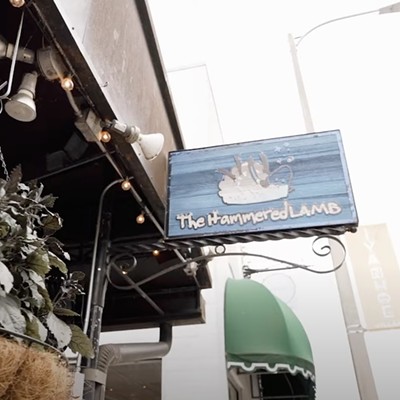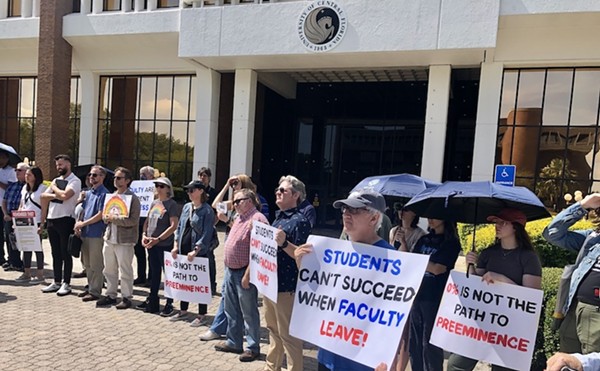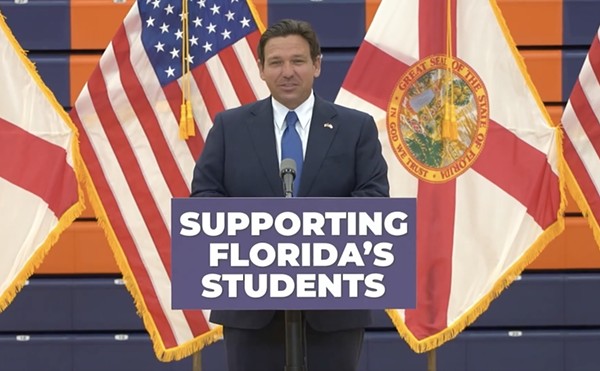Editor's note: This is the first in an occasional series in which we chat with people making news in Central Florida. Hope you like it.
Three years ago, Mollie Ray Elementary was the pariah of the Orange County Public School system. Two "F" grades in a row under the state's A+ for Education plan made it one of the first in the state deemed "failing," which meant that its students were offered vouchers. The prospects weren't good: 99 percent of the school's students were considered poor, and one-third of the student body spoke Creole as a first language. Neither is a good predictor of improvement, since poor schools – Mollie Ray is located in Pine Hills – tend to test poorly, and few "A" schools have many poor kids.
But the school turned itself around. In 2003, it got a "C." In 2004, a "B." And this year, finally, Mollie Ray became an "A" school. It was a grand achievement. The school's administrators pulled things together, forced parents to get into the learning business, provided free tutoring and made sure all the material on the FCAT was covered before kids took the test.
There was another player, however; 83 of them, actually. Volunteers from the Home Builders Association of Metro Orlando adopted the school in 2002 and logged more than 1,500 hours tutoring, sponsoring field trips, building bookshelves and raising more than $12,000. Their involvement played no small part in Mollie Ray's turnaround, and offers some insight into how to improve low-performing schools across the area.
We talked to William Silliman, president of the HBA, about the school.
OW: Tell us, if you would, the circumstances behind HBA's decision to adopt Mollie Ray in 2002.
Silliman: Well, I think that there were several board members trying to come up with some ways that the Home Builders Association and its members could become more involved in the community, and, as you know, schools are a big part of our community – so we kind of got together and saw a need at Mollie Ray. [We] debated and discussed it, and decided we would adopt the school and begin to help and see if we couldn't effect some real and meaningful change. That's how it started. There were a couple key members that Joy [Taylor, Molly Ray Elementary's principal] had approached – and one thing led to another.
OW: An area with poor schools is harder to market to new homeowners, but what made you decide to focus on Mollie Ray?
Silliman: One of the things that the HBA has tried to get involved with is the schools, and in selecting which school we decided, we felt the same way – that if we were going to do this we needed to pick a school that really needed a lot of help. Mollie Ray came up; I think Joy was reaching out to different business entities and one of the parents and one of our members and Joy got together, and the end result was we thought our efforts would be absolutely better spent at a school that obviously had needs versus a school that was doing fine. That's how it really happened; it was people contacting people, and then ultimately we thought that this was a school that really needed the support, and we decided to see what we could do about it.
OW: Describe how your organization assessed Mollie Ray, and what game plan you drew up to help.
Silliman: Well, I don't really think there was a game plan. I think that that would be the wrong [way] to tell it in this interview. I think that what happened was when we decided to get involved, we went and talked to Joy, and we let Joy kind of tell us what she needed and what she thought and then we put our resources behind that.
One of the first things we did, obviously, was landscape. We thought, "We're in that type of business," and we thought that needed to be done, so we did that. Then, obviously, the mentoring program was another program that Joy and [the HBA] thought would be a good thing to start. And then as time went by there were different needs that Joy had, and she would contact us and we would try to fill those needs. That's kind of the step-by-step process – we listened to what they needed and tried to respond. It wasn't us saying, "We need to do this." We sort of responded to what the principal asked us to do.
OW: The poorer a school, the worse it will perform on standardized tests. In theory, that's because these schools lack resources, and parents are less involved. Were those factors evident at Mollie Ray?
Silliman: Well, I think that was the case, and I think in general that's true. I don't think you can draw just broad strokes, I think every child and … every school is different, and I think that in general what you're saying is true. I think that parental involvement is the key, and I think that Joy and her staff have done a great job of galvanizing the parents, of entering in a business entity that could give support and help the children financially with field trips and beautifying the school, and just letting the kids know they're cared for. The HBA is a piece of the puzzle, and it's an important piece, but it's not in any way due to the HBA's involvement that this school has turned around. There are many things that have happened. We're a healthy and strong piece of a bigger puzzle that has made all this happen. … I think there's a feeling that these students feel they're loved, they feel challenged and they want to do good. They've caught the spirit and for some reason all these elements have come together to create a great situation.
OW: What was your organization able to offer that Orange County Public Schools couldn't?
Silliman: I think the No. 1 thing is, I think the students caught on to the idea that somebody cares about them. That somebody – not only the building industry but the teachers, the school system, the administration, all these entities – really cared about them. When you create an environment like that, where kids want to come to school and where kids are happy at school and they're going on field trips and they're challenged and the teachers are really involved and the parents get involved, all these different forces [are] kind of coming from different ways that let these little children know that they're cared about and they're meaningful … I don't think a lot of these children in some of these other schools that we've talked about have that, that's the distinct difference in my opinion.
OW: Is there something that all of the OCPS could learn from your experience, short of the HBA adopting every school that's out there that's not doing so well?
Silliman: I think so. I think what the HBA has done – let's just stick to what the business community could do. The business community has resources to beautify campuses, the business community has resources to take these kids on great field trips, buy them school supplies, backpacks, mentor the students, come in and talk about their jobs and become involved. And from a business aspect, there's a lot of great industries and a lot of great companies that have the people and the resources to pick a school and do that. I think that when that happens, it's a piece of the puzzle that builds this feeling for the children that the community cares about them. It's just a change in attitude. So yes, if there's one thing … we could model, I think [it would be] the great industries and the great businesses in Central Florida picking a school and getting involved. Surely Mollie Ray shows that that can make a difference.
OW: How do you get other businesses involved?
Silliman: Well, I think you['ve] got to ask. I think that the principals have great contacts with parents within the schools that work in these good companies and I think that a lot of the companies, if they're asked, would answer. And I think also an article like yours, [or] the Sentinel picking up this story – maybe other companies can look at this and there, the leaders within those companies can say, "Hey, this is something we ought to do to." … The more the press picks up on this and [it] gains momentum, maybe we're onto something here. So I commend you doing this article.
OW: How has it made you feel to watch this school grow?
Silliman: There's nothing any of us can do … greater than [improving the] education and the educational experience of our children. There is nothing more satisfactory and more satisfying than that. So there is a great deal of satisfaction from our members. We're extremely proud of the little engine that thought it could, and the change in the school spirit, and the change in the teachers, and the total turnaround of this little school out of nowhere. And it is absolutely satisfying to see your efforts achieve goals.
So now we turn to, "We['ve] got an 'A' now, let's keep it an 'A.'" We're not going anywhere, we're still going to be out there working and we're going to go out there and do some beautification before school starts, and onward we go. You know, getting to the top is something that we all strive to do and very few of us get there. Staying on top is harder than getting there.

















